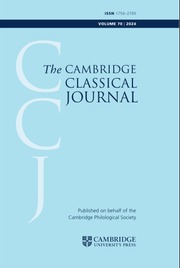Article contents
THE POET AND THE EVANGELIST IN NONNUS’ PARAPHRASE OF THE GOSPEL ACCORDING TO JOHN
Published online by Cambridge University Press: 23 July 2020
Abstract
Christian poetry, and biblical epic in particular, is intensely self-conscious. Both Greek and Latin Christian poets begin or end their compositions, paraphrases and centos with poetological reflections on the value and objectives of their works. The fifth-century Paraphrase of the Gospel according to John is an anomaly in this tradition. While Nonnus’ mythological epic, the Dionysiaca, is heavily self-conscious in that it includes a strong authorial voice as well as an extensive prooemium and an interlude, the Christian Paraphrase has no prooemium, epilogue or interlude, and its narrator never identifies himself. This article examines two passages in the Paraphrase where subtle, implicit poetological reflections may be detected, and then explores the reasons why Nonnus may have chosen to deny the Paraphrase a clear (meta)literary identity. It argues that Nonnus’ poem presents itself as the Gospel of John, and that its narrator ‘becomes’ John the Evangelist in a spiritual exercise which is indebted to Origen's views on that Gospel.
- Type
- Research Article
- Information
- Copyright
- Copyright © The Author(s), 2020. Published by Cambridge University Press on behalf of The Cambridge Philological Society.
Footnotes
For helpful comments on earlier versions of this article I wish to thank audiences at Lisbon (‘Modulations and transpositions: the contexts and boundaries of “minor” and “major” genres in Late Antique Christian poetry, i’ conference, June 2017; with special thanks to Gianfranco Agosti and Anna Lefteratou) and Salamanca (5th ISLALS conference, ‘Literature squared: metaliterary reflections in Late Antiquity’, October 2017). The two anonymous reviewers for CCJ offered invaluable criticism and bibliographical suggestions. I also gratefully acknowledge the financial support of FCT (Fundação para a Ciência e a Tecnologia), Portugal, through the project PTDC/LLT LES/30930/2017 (national funds).
References
Works cited
- 2
- Cited by


